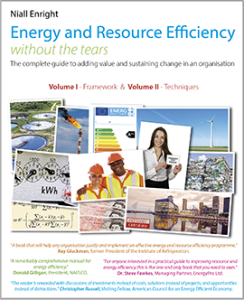There are many businesses where the principal product becomes worthless after a certain point in time. An empty hotel room cannot be sold again the next day, theatre tickets have no market once the curtain goes up, fresh fruit has a finite shelf-life and an unoccupied airline seat is valueless once the plane has taken off.
Resource efficiency is the same in that the potential savings in any day can never be realised again at a later date, they are gone, lost forever. Needless money has been spent; it has flowed out of the organisation, never to be seen again. Meantime, the emissions, waste or other environmental impacts are accumulating, becoming more difficult, and expensive, to undo.
The net savings that we make through resource efficiency will flow directly to the bottom line, day after day, month after month. We need to inject some of the same urgency into our resource efficiency programs as hotels or airlines etc. do in terms of avoiding unsold products or services.
So do not be afraid to say that: “every day/week/month/year that passes we are needlessly losing/throwing away $x, and causing y damage” or, put positively: “every day/week/month/year that passes we can add $x to the bottom line of our business, equivalent to $z in sales[1],and also prevent y damage to the environment…so we need to act now, not tomorrow/next week/next month/next year.”.
The emphasis on immediately eliminating something that is currently a pointless drain on our performance can be very powerful, particularly if we can demonstrate that the effort required is low. Change must always challenge the inertia that maintains the status quo.
[1] Converting a saving into a sales number is a neat way to emphasise the value of a resource efficiency program. Most organisations understand just how hard, and expensive, it is to create new sales. See more on presenting value in Chapter XXX



0 Comments